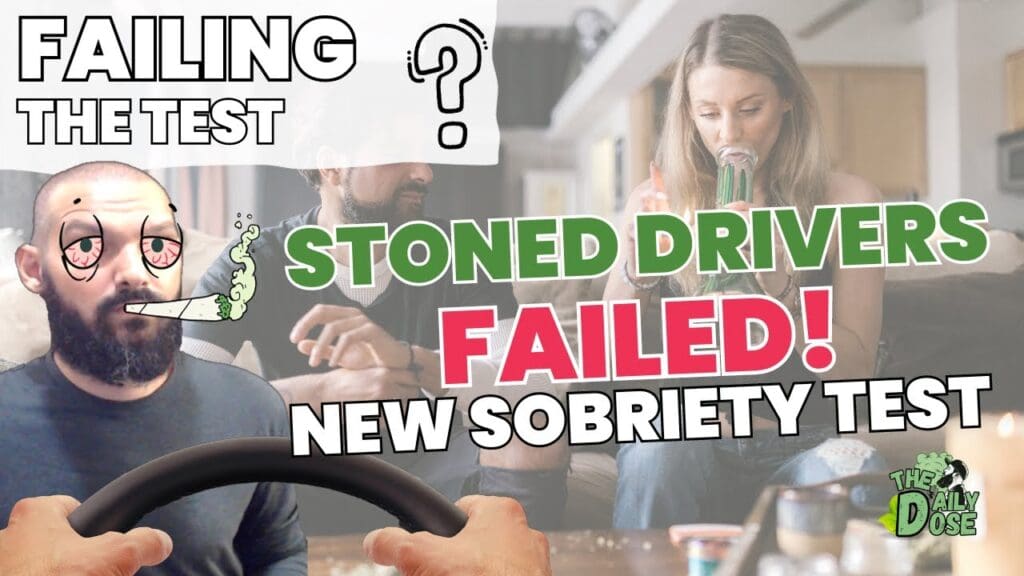Check out the full audio episode here The Daily Dose Podcast Audio
Stoned Drivers And Sobriety Tests Results Out Now
Introduction
The legalization of cannabis for medical and recreational use in many parts of the world has brought about significant changes in society. Alongside these shifts, concerns over road safety and the need for accurate cannabis sobriety tests have grown.
This article delves into the landscape of cannabis sobriety testing, discussing the science behind cannabis impairment, the development of new tests, their accuracy and reliability, and real-world failures. We also explore the legal implications and challenges associated with these tests and conclude with a vision for the future of ensuring road safety.

The Need for Cannabis Criminal Reform
With the growing acceptance of cannabis use, it is imperative to address concerns related to impaired driving. Cannabis impairs cognitive and motor skills, affecting a person’s ability to operate a vehicle safely. As a result, the need for accurate and reliable cannabis sobriety tests has become increasingly critical.
The Science Behind Cannabis Impairment
Understanding how cannabis impairs a person’s ability to drive is essential for developing effective sobriety tests. Cannabis affects various cognitive functions, including attention, memory, and decision-making.
The key psychoactive compound in cannabis, delta-9-tetrahydrocannabinol (THC), is responsible for these impairments. When THC enters the bloodstream, it affects the brain’s cannabinoid receptors, leading to altered perception and decreased motor skills.

Field Sobriety Tests vs. Cannabis-Specific Tests
Traditional field sobriety tests, such as the walk-and-turn or one-leg stand, are used to assess impairment due to alcohol. However, these tests may not be suitable for detecting cannabis impairment. The development of cannabis-specific sobriety tests has become crucial to accurately identify individuals who are impaired by cannabis.
The Development of New Cannabis Sobriety Tests
Researchers and law enforcement agencies have been working on creating effective cannabis sobriety tests. Some tests measure the concentration of THC in a person’s blood, while others focus on cognitive and motor function assessments. The implementation of oral fluid tests and smartphone apps that analyze cognitive abilities has shown promise in recent years.

Evaluating the Accuracy and Reliability
Assessing the accuracy and reliability of cannabis sobriety tests is a complex task. These tests should not only detect cannabis use but also measure impairment accurately.
Studies have shown that current tests vary in their effectiveness and may produce false positives. Rigorous research and development efforts are essential to refine these tests.
Real-World Failures: Case Studies
Real-world cases of cannabis sobriety test failures have raised questions about the tests’ reliability. We examine specific instances where individuals were wrongfully accused of impaired driving due to false positive test results, shedding light on the limitations and challenges faced by these tests.

Legal Implications and Challenges
The legal landscape surrounding cannabis sobriety tests is intricate. Many jurisdictions have implemented per se limits for THC in the blood, similar to alcohol limits.
However, setting such limits is a contentious issue, as THC can remain in a person’s system long after impairment has ceased. Additionally, legal challenges are arising regarding the admissibility of cannabis test results in court.
Ensuring Road Safety: The Way Forward
In conclusion, the need for accurate cannabis sobriety tests is undeniable. While progress has been made in developing these tests, there is still much work to be done to ensure their accuracy and reliability.
The legal challenges surrounding cannabis sobriety tests require thoughtful consideration, including revisiting per se limits for THC.
As society continues to evolve in its acceptance of cannabis use, the goal should be to establish effective testing measures that genuinely promote road safety, preventing impaired individuals from getting behind the wheel.
Balancing personal freedoms and public safety is a complex task, and it is a challenge that requires ongoing research, cooperation between various stakeholders, and a commitment to finding the best possible solutions.
FAQs
How does cannabis impair driving?
What are cannabis-specific sobriety tests?
Are cannabis sobriety tests accurate?
How long does THC stay in the system?
What are the legal challenges related to cannabis sobriety tests?
Related Articles:
- California Cannabis Recall Explained Now
- Quitting Cannabis A How To Guide Now
- Ny Post Article
- More Info On These Studies
- Drug Tests For Cannabis Laws Change
Meet The Author





